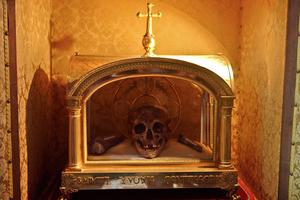Write +JMJ+ at the Top of 2024 and Give Your Family to the Holy Family
We need to consecrate our families to the Holy Family so that in another 800 years we can look back and see how Christian faith saved civilization once again.

Sometimes my students submit their essays or exams with the letters +J.M.J.+ atop every page. Their parents or some teacher taught them to do so. The initials, of course, are themselves a devotion to the Holy Family: Jesus, Mary and Joseph. The letters almost stare at me, not as distractions but as a steady reminder of what abides, what unites, and what orders us to our proper end.
Public devotions to the Holy Family began in the 14th century, possibly due to the popularity of St. Francis’ nativity creches, and the consequent increase in piety toward St. Joseph, whom theologians began to consider free from venial sin due to his union with Jesus and Mary, his immaculate spouse.
Such devotion to the Holy Family grew organically throughout the Counter-Reformation, against the individualist tendencies of modern Protestantism, and the devotion spread like wildfire through French and Spanish missions to the New World. Thus, it is not surprising that the first Confraternity to the Holy Family arose in “New France” (Montreal) in the 17th century and began celebrating the first local Feast of the Holy Family on Jan. 22.
In Barcelona, construction began on Sagrada Família on March 19, 1882, under the inspiration of a bookseller who led a lay confraternity devoted to St. Joseph, and who wanted his place highlighted in God’s plan of salvation through his Holy Family. Pope Leo XIII would soon recognize the Feast of the Holy Family in 1893 as a bulwark against the destructive power of industrialization which was wreaking havoc upon the family — and he asked Catholic families to consecrate themselves to the Holy Family on this day to safeguard the first society, and the fundamental unit of all other societies.
Pope Benedict XV would subsequently elevate this feast to the universal calendar in 1921 in the Octave of Epiphany, and after the Second Vatican Council, the feast was moved from the Sunday after Epiphany to the Sunday after Christmas, which is how we now celebrate it today.
But it’s less the place of this feast in the liturgical calendar (should it belong to Christmas or Epiphany?) than its public meaning that interests me. What should it mean for all of us? A hundred years ago, G.K. Chesterton predicted the crisis of sexual morality which today threatens the family. And Pope St. John Paul II gave the greatest attention to this crisis, orienting his entire teaching office to safeguarding the family, observing that “as the family goes, so goes the nation and so goes the whole world in which we live.”
But now we see the wreckage clearly. We see the consequences of spiritual onanism and fatherlessness all around us.
Today, we need devotion to the Holy Family more than ever before. We need to raise high the Nativity in public places of honor. We need images of the Holy Family above our doorposts and upon our mantels. We need to consecrate our families to the Holy Family so that in another 800 years we can look back and see how Christian faith saved civilization once again.
This is why I think so highly of the student who writes “J.M.J.” atop his exam. Those three letters, however rote, always fill me with joy: So long as there are Catholic families, and Catholic schools, who teach our young people to consecrate themselves and their families to the Most Holy Family, we’ll have a bulwark against disorder, we’ll have hope for the family, and so the person. Like that bookseller who envisioned cathedral spires which raised the standard of the Holy Family over all of Barcelona, we must become the kind of people who inscribe J.M.J. upon all our labors. In doing so, we might raise the hopes of the whole world.
- Keywords:
- holy family
- new year's day
- 2024
- mother of god
















